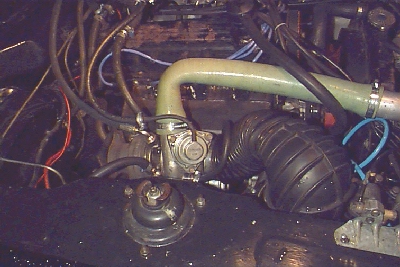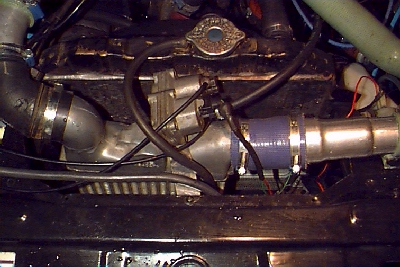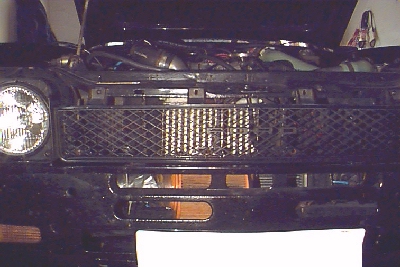Turbo Power!
I was determined to turbocharge the BlackMagicCapri, but I wanted to to it in a budget
way - Junk Yard turbo if you like. Therefor, I decided to keep the standard bottom end,
just ad an oil cooler and the necessary oil feed and return lines for the turbo itself. I
got some help from a friend at work to weld a simple exhaust manifold, and I dropped the
front suspension crossmember to be able to remove the oil sump with the engine still in
the car. Removal of the oil sump is necessary to fit the oil return fitting.
With the battery moved to the trunk, the fuel metering head and airflow meter fit nicely
on the battery shelf, and I replaced the mechanical low pressure fuel pump with an
electrical pump instead (to feed the small tank for the high pressure pump).
When you do these kind of changes to a car in Sweden, you need to get it inspected to make
it road legal. I had quite some communication with the authorities before they approved my
combination. When they finally did, I was in a real hurry to get the car together for the
inspection on a monday. The first test start was made the saturday before, and the car ran
like crap. I couldn't get a decent idle, and it misfired all over the place. I tried
fiddling with fuel and ignition settings, but I didn't have time to get it quite right.
On the inspection the car wouldn't
idle, so I got a straightforwad fail because they could test it for emissions. Otherwise I
just got some minor fail points, and now I had a months time to fix it. The
rough running
was cured by such an easy thing as new plug wires, and the next inspection was passed with
flying colours!
 |
A general shot of the layout in 1999. |
 |
The 90-degree bend at the outlet looks worse than it was. |
 |
The control pressure regulator lays on top of the intercooler |
 |
The intercooler shines nicely through the grille. The
airfilter (Saab 99) gets plenty of cold air. The Saab filter was just there as a Band-Aid
because Hansen Racing sent my K&N-filter by boat from the US... |
Later this summer I got hold of a Saab APC (automatic performance control) system. This is
a neat thing that controls the boost pressure partly based on a knock sensor, partly on
engine revs and partly on boost pressure. If knock is detected boost is lowered to a
safe(er) level. It is a stand-alone system up until 1989 in some models, and even later in
some. I installed the system during the summer, and spent some time tweaking it. I never
got it to work properly on this engine though, probably because the block has no hole
tapped for a knock sensor, so I used one of the inlet manifold bolts.
I also got myself a G-tech Pro performance meter, to help see if changes to the car were
improvements or not. The best bhp figure I got was 117 bhp (at the rear wheels), which is
a healthy improvement over the 95 bhp (flywheel) that a standard Swedish spec Pinto should
develop. I had problems with detonation though, probably partly due to too high CR, partly
due to not enough fuel and partly due to wrong ignition timing.
Before the car was put in storage for
the winter I replaced the points ignition with an "Ignitor" setup. One thing
less to worry about...
All in all this old Pinto covered more
than 5000 kilometres with the turbo, totally standard. The Pinto may be a heavy old slug,
but it can take some abuse...even so there was a new engine lurking...see the next page!

